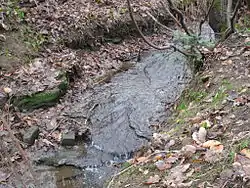strauts
Latvian

Strauts
Etymology
From a 17th-century verb straut (“to flow, to float”) (later replaced by straust (“to flow quickly, to stream”)), from Proto-Indo-European *srew- (“to flow”), with an epenthetic t (whence also straujš (“quick, fast”)). Cognates include Lithuanian sraũtas (“stream, current, flow”) (dialectal straũtas), Sanskrit स्रोत (srótas-, “flow, river”); for the old verb straut, compare also Lithuanian iterative verb sravė́ti (“to flow slowly”), Sanskrit स्रवति (srávati, “to flow”), Ancient Greek ῥέω (rhéō, “to flow”).[1]
Pronunciation
- IPA(key): [strāūts]
Noun
strauts m (1st declension)
Declension
Declension of strauts (1st declension)
| singular (vienskaitlis) | plural (daudzskaitlis) | |
|---|---|---|
| nominative (nominatīvs) | strauts | strauti |
| accusative (akuzatīvs) | strautu | strautus |
| genitive (ģenitīvs) | strauta | strautu |
| dative (datīvs) | strautam | strautiem |
| instrumental (instrumentālis) | strautu | strautiem |
| locative (lokatīvs) | strautā | strautos |
| vocative (vokatīvs) | strauts | strauti |
Synonyms
- (dialectal term) valks
Related terms
- straume
- straujš
- strāva
References
- Karulis, Konstantīns (1992), “strauts”, in Latviešu Etimoloģijas Vārdnīca (in Latvian), Rīga: AVOTS, →ISBN
This article is issued from Wiktionary. The text is licensed under Creative Commons - Attribution - Sharealike. Additional terms may apply for the media files.